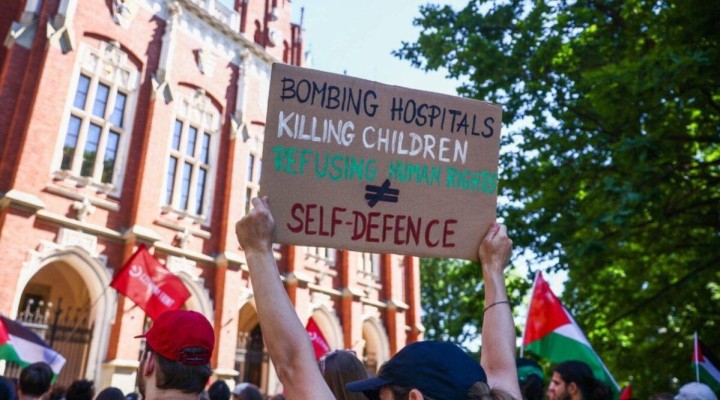We need to call out the hypocrisy of the humanitarian paradigm

Israeli Prime Minister Benjamin Netanyahu’s address to the Lebanese people before bombing their country was eerily similar to the rhetoric usually associated with Gaza. Hezbollah, he told the Lebanese, are using them as human shields and hiding weapons in their homes; the latter was made to sound more familiar by mentioning specific family rooms: “Rockets in your living rooms and missiles in your garage.” To seal Israel’s impunity in Lebanon after telling the Lebanese population to flee from his army’s bombs, Netanyahu added, “Don’t let Hezbollah endanger your lives.” As Israel’s kill toll rises in Lebanon, almost 500,000 Lebanese have been forcibly displaced from their homes in a matter of two days. This can be added to the 1.9 million Palestinian civilians who have been forcibly displaced from their homes in Gaza by Israel.
Meanwhile, the US reached for its playbook on Gaza and endorsed Israel’s right to defend itself, this time allegedly from Hezbollah. “No nation should have to live with these threats right across their border, right next door,” said US White House National Security Spokesperson John Kirby.
How about people not having to live with Israel’s threats at their border or in their homes, Mr Kirby?
Israel has invaded Lebanon on at least five occasions since the late seventies, remember, not including numerous air strikes.
Now diplomats are revealing that the genocide is Gaza is only the beginning of the chaos in the Middle East and the humanitarian paradigm is the only way for them to feign political concern. So blatantly is the world supporting Israel’s actions, that it has come to the point where a failed humanitarian paradigm remains at the forefront of the international agenda, and the discrepancy is rarely called out.
The international community sustains this discrepancy between colonial violence, war, genocide and humanitarian aid. The former reigns supreme and yields profits. Humanitarian aid, on the other hand, works like a defunct charity to make sure that the displaced remain too busy trying to survive to do anything untoward against those responsible for their situation. They face a daily struggle to survive Israeli aggression, bombs and the international community’s collaboration allowing Israel to eliminate who it chooses for territorial gain. “Greater Israel” is the Zionist objective.
We now see that speaking out against breaches of international law is being criminalised, and being taught not to speak out is normalised; in turn, the normalisation of complicity in genocide and forced displacement completes the cycle. World leaders, we are told, must be allowed to talk and lead uninterrupted, and they will decide which nation is to be massacred, displaced, forced to live in temporary shelters while foraging for food, waiting for a temporary pause in the slaughter to receive polio vaccines and be killed later; letting Israel control the lives and deaths of civilians, and all because the international community offers humanitarian aid in return for silence. For the victims, the humanitarian paradigm is a failure on so many levels, a licence to silence criticism and an open invitation to perpetual displacement and premeditated murder.
What do we make out of humanitarian aid as a political paradigm? How is a bare minimum of shelter against biting cold an acceptable measure, when tents provide no shelter against bombs and bullets? Why is it acceptable that countries bolstering Israel’s genocide in Gaza and its war in Lebanon get to dictate who gets humanitarian aid, and when?
The Norwegian Refugee Council-led Shelter Cluster has estimated that it would take aid agencies more than two years to deliver 25,000 sealing kits to Gaza at the current rate of two truckloads per week. In the face of humanitarian aid being weaponised — US Secretary of State Antony Blinken misled Congress about Israel blocking aid to Gaza, for example — leading to the slow death of its intended recipients, why is the world keeping silent? We need to call out the hypocrisy of the humanitarian paradigm.
https://www.middleeastmonitor.com/20240926-we-need-to-call-out-the-hypocrisy-of-the-humanitarian-paradigm/
 TheAltWorld
TheAltWorld 
0 thoughts on “We need to call out the hypocrisy of the humanitarian paradigm”